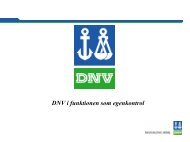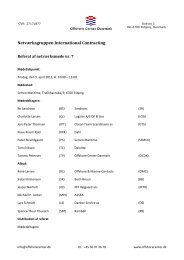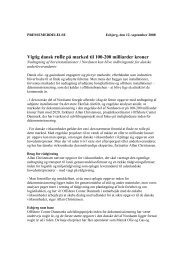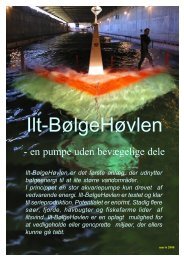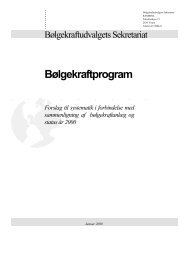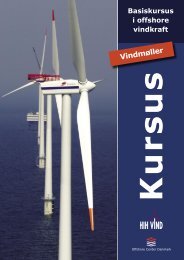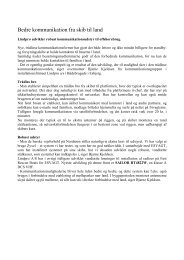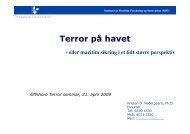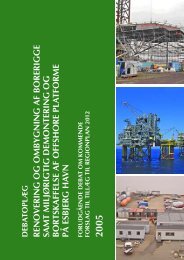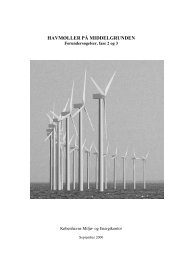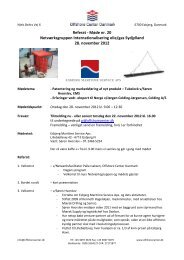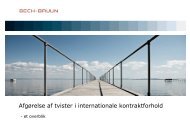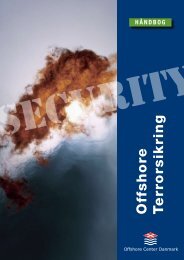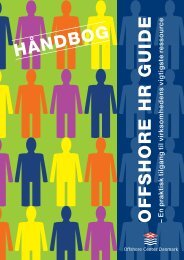Read News Magazine (pdf) - Offshore Center Danmark
Read News Magazine (pdf) - Offshore Center Danmark
Read News Magazine (pdf) - Offshore Center Danmark
You also want an ePaper? Increase the reach of your titles
YUMPU automatically turns print PDFs into web optimized ePapers that Google loves.
Safety Act has been received in a positive<br />
way. The Act is part of a stepwise harmonization<br />
of safety standards and requirements<br />
to safety training. The new SSR-statement<br />
will still require companies to have safety<br />
certifi cations in each single land of operation,<br />
but will clearly make it easier to move from<br />
one country to another without applying for<br />
new approvals, since the Safety and Health<br />
statement is the same standard for all oil<br />
producing countries in the North Sea.<br />
Falck Nutec, STMS and other suppliers of<br />
safety courses still see a need of a ”gap-analysis”,<br />
taking into account local considerations<br />
so that each individual trainee has been<br />
trained to solve exactly the required task at<br />
the actual location.<br />
- In 1999 the term ”Mutual Recognition of<br />
Safety Training” was introduced, where the<br />
educational level of the trainee was anticipated,<br />
but where a need was seen for supplemental<br />
training to solve the tasks given. Instead<br />
of starting from scratch each time, the trainee<br />
is given supplemental training, and I see the<br />
<strong>Offshore</strong> Safety Act as a good opportunity to<br />
certify the Danish safety courses with respect<br />
to an international certifi cation, Jens Viggo<br />
Sørensen, operational manager of Falck<br />
Nutec, states.<br />
- And the next question might be, if there<br />
some time in the future will be a standard for<br />
conducting safety courses, which cover both<br />
national and international standards - Jens<br />
Viggo Sørensen continues.<br />
50 <strong>Offshore</strong> <strong>Center</strong> <strong>Danmark</strong><br />
Yearbook 2008<br />
With their base in Esbjerg, the Danish<br />
branch of Falck Nutec is a good example of<br />
the internationalization, which presently is<br />
taking place within the offshore industry,<br />
and more specifi cally within safety and<br />
training, as a response to international requirements<br />
for standardised safety courses,<br />
certifi cation and training. From being a<br />
local school for fi remen in the early 1990´s,<br />
Falck Nutec Esbjerg is now part of an<br />
international organization with 17 centers<br />
for consultancy and training in a Danish<br />
company operating worldwide.<br />
Harmonized to<br />
IADC-requirements<br />
Each year, approximately 100,000 people<br />
participate in one or more courses at the<br />
Falck Nutec centers placed worldwide. Add<br />
this the large number of people attending<br />
the offshore courses of the other key course<br />
vendor STMS based in Esbjerg, the number<br />
of people trained in the offshore industry is<br />
quite signifi cant. At Falck Nutec the topics<br />
are offshore and maritime safety, ISPS<br />
security, chemical training, crisis management,<br />
and safety consultancy. Falck Nutec<br />
presently cooperates with IADC – the<br />
International Association of Drilling Contractors<br />
– to develop a safety course, which<br />
can be approved by international governing<br />
bodies, and also a number of test courses<br />
monitored by international authorities. ■<br />
Simulation<br />
of Crisis<br />
Management<br />
Coinciding with the new <strong>Offshore</strong> Safety Act,<br />
<strong>Offshore</strong> <strong>Center</strong> <strong>Danmark</strong> has coordinated a<br />
project attended by a numbers of its members<br />
and a number of European institutions.<br />
The project will strengthen the training and<br />
response of personnel during oil spill catastrophes<br />
and may later be extended to cover<br />
safety scenarios, and is already being used for<br />
training by the Danish Admiral Fleet.<br />
In cooperation with several Esbjerg companies<br />
and Norwegian RKK Rogaland, Spanish<br />
Centro Jovellanos and the Estonian Maritime<br />
Academy, <strong>Offshore</strong> <strong>Center</strong> <strong>Danmark</strong> has<br />
coordinated a European project developing<br />
the CMS2 web-based simulations trainer for<br />
oil spill. CMS2 is based on real-life scenarios<br />
supplied by the maritime authorities of the<br />
participating countries. All relevant data are<br />
collected and logged as a tool of communicating<br />
and training in oil spill, with a later<br />
evaluation of the response of the trainees by a<br />
commander.<br />
- The new legislation and the cooperation<br />
amongst national and international companies<br />
and institutions is a good illustration of<br />
the attention and focus given to safety and<br />
environment within the offshore industry. The<br />
internationalization of this effort is important,<br />
so that the offshore industry can demonstrate<br />
that we do not only consider the safety and<br />
environmental requirements set up by national<br />
authorities, but also take international approach<br />
to reduce the risks, Peter Blach, director<br />
of <strong>Offshore</strong> <strong>Center</strong> <strong>Danmark</strong>, states.



